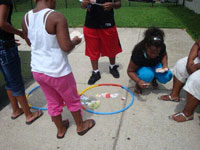
Adam Becker
by Adam Becker, PhD, MPH, Executive Director
With Congress back in session, I thought this would be a good time to reflect on my recent visit to Capitol Hill on September 16. I was invited to serve on a panel by the National Association of Children’s Hospitals and Related Institutions (NACHRI) to brief Congress about the important role that children’s hospitals play in childhood obesity prevention. NACHRI staff set up the panel to represent the broad range of roles that hospitals play – from community-based prevention to intensive clinic-based behavior change interventions, to surgical and other specialty care for those children who are in urgent need of treatment. It was an honor to be among distinguished colleagues from hospitals in New York, Maryland, and Washington State. It was a privilege to hear from a very brave young high-school senior and her equally courageous mother as they described the challenges and the heartbreak that their family faced dealing with childhood obesity.
Staff members from the offices of more than 30 U.S. Representatives and Senators came to learn about childhood obesity and what hospitals and hospital-based programs were doing. I couldn’t help but think about how important it had been to childhood obesity prevention that First Lady Michelle Obama took such a public stand on the issue. I believe that this visible show of concern helped to bring so many people into that room. I told them about the many partners who make up CLOCC – more than 1,000 organizations in Chicago and beyond who are at the “front lines” of obesity prevention; working to make sure that kids and families know what the elements of a healthy lifestyle are, understand the risks of not making healthy choices, and have access to environments that make healthy choices easier where they learn, play, and live. I told them how the health care system was an essential component of the battle against obesity but that doctors alone cannot solve the problem.
As I listened to the other panelists talk about how complex and challenging it is for them to find the resources and models they need to do the very complicated and hard work of treating overweight and obese children, I thought about how much harder it would be if those of us fighting to improve nutrition and physical activity for children weren’t there trying to keep kids healthy enough that they didn’t need treatment.
I was truly humbled to be in one of the very buildings where decisions get made every day that affect children and families. Decisions about how much money our schools will get to provide food to children. Decisions about whether our transportation system will accommodate those who want to walk or ride their bikes for at least some portion of their daily commute. Decisions about how much of the fertile soil across the U.S. will be used to feed people vs. animals vs. vehicles. Decisions about how many children will have health insurance and what the quality of that insurance will be. And yes, decisions about reimbursement to health care institutions for the basic and specialized services that are so essential to protecting children when they are overweight or obese.
Congress headed home for vacations or to work on their re-election campaigns before they decided on some of the critical issues facing children and families. I am frustrated that Congress went home with so much work yet to do, but I continue to be hopeful because so many people showed up that day to hear from us and because so many champions for children and families are working every day in Chicago, in Maryland, in New York, in Washington State working hard to make sure kids grow up healthy and happy.





